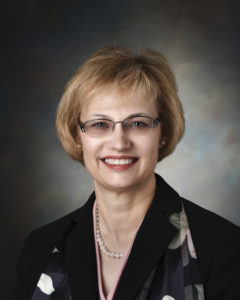Penn State awards first Schreiber scholarship
May 11, 2021Anicia Anderson can trace her interest in a speech-language pathology career to hearing a guest speaker during a high school health class. She was in 10th grade at North Haven High School, a public high school in North Haven, Conn.
The speaker was looking for volunteers to come and work in a group home for older adults with autism. Anicia said she thought it sounded interesting, and she needed the community service hours, so she went.

“That was my first experience with people that were non-verbal,” said Anicia, thoughtful and gracious with her time during a recent phone interview. “That kind of geared my passion to wanting to work with people that have communication challenges.”
That first psychic nudge started her on a path toward a career she knew nothing about as a 15-year-old in the little town of North Haven (population about 25,000), a northern suburb of New Haven, home of Yale University.
Anicia received her bachelor’s degree from Penn State this spring and will begin pursuing a master’s degree there in speech-language pathology. She is the first recipient of the Schreiber Center for Pediatric Development Educational Equity Graduate Scholarship. The scholarship comes from a new fund established by Schreiber and Penn State to address the lack of diversity in the field of speech therapy.
“There’s not a lot of diversity in the field of speech-language pathology,” Anicia said. “Clinicians see clients from all different backgrounds and races and cultures. Inclusion is important: having a diverse clientele, having more diverse students entering the field, having more diversity among clinicians. I look forward to helping to make that change.”
Anicia didn’t know much about the scholarship or Schreiber before she was admitted into the grad program. “I’m in a diversity recruitment group, and I heard the name, but I didn’t really know what it was about.”
That soon changed. Dr. Diane Williams is a professor and department head in the Department of Communications Sciences and Disorders, where Anicia will continue her speech therapy studies. She approached Anicia about the scholarship.

of the Department
of Communication Sciences
and Disorders at Penn State
“We chose Anicia because of her academic achievements,” Dr. Williams wrote in an email, “her strong letters of recommendation, her interest in working with children with complex communication needs like those served by the Schreiber Center, and because of her efforts around issues of diversity and inclusion.”
Dr. Williams joined a recent Schreiber board meeting to announce the first scholarship award. In her remarks, she thanked Schreiber’s leadership for its willingness to take a strong stand on increasing diversity, and for their good timing.
“When James (DeBord) reached out to us last year, the timing was just right,” Dr. Williams said. “My department had come together to make a commitment to work to increase diversity in the field of speech-language pathology. James’ offer to raise funds for a scholarship to support a student in speech-language pathology from a diverse background was such a generous one. We saw it as not only an opportunity to help us increase the diversity in our graduate program and our field but also as an opportunity to form a stronger relationship with the Schreiber Center, a program with an incredible history of service to the community.”

DeBord, Schreiber’s president, said he was excited to hear that Penn State had found such an outstanding student to be the first Schreiber scholarship recipient. And, he added, this is just the beginning.
“My hope is that Anicia is the first in a long line of scholars and future speech-language pathologists who will change countless lives for the better,” James said. “And that they will better reflect the communities in which they serve. The plan now is that this continues every two years, in perpetuity. She will be the first in this pantheon of these distinguished scholars.”
Anicia comes from a town where fewer than 5 percent of the population is black. She said she was one of the few black students at her high school.
Pursuing a career in speech therapy, in which around 95 percent of therapists are white, might seem intimidating for some students of color. Anicia was unfazed.
“Since I went to a school that didn’t have a lot of diversity, it’s something that I’m used to,” Anicia said. “Increasing diversity is important; it can help to open people’s minds.”
Donate to the scholarship fund
Schreiber has raised about half of the $275,000 needed to fulfill its pledge to create the $550,000 scholarship fund. To make a donation and help Schreiber continue the work of making the field of speech-language pathology more diverse, visit the Penn State Scholarship Fund page here.